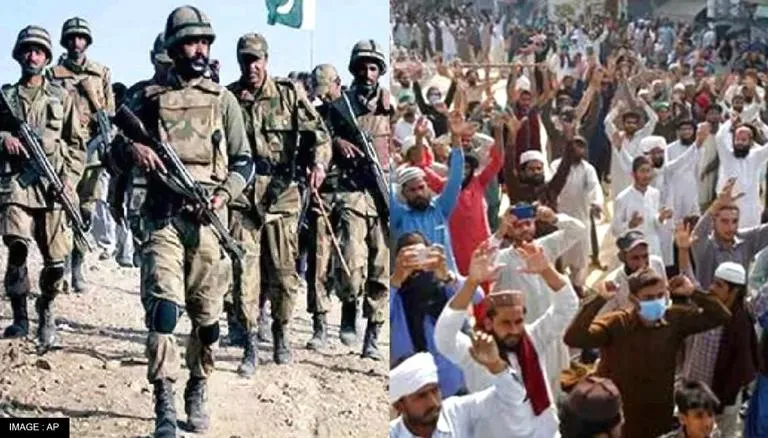Human Rights Council of Balochistan, a non-profit and non-partisan human rights group, recently reported that 48 killings, including 11 cases of extrajudicial executions, have been committed by paramilitary forces of Pakistan in the month of July. As per the rights organisation, 45 incidents of enforced disappearances were reported throughout the month.
In its report, the Human Rights Council of Balochistan said, “Systematic killings and enforced disappearances are considered to be the most pervasive state violations against the people in Balochistan, affecting hundreds of thousands of civilians. These crimes are largely carried out by Pakistani security forces and their affiliated militias locally known as death squads,” ANI reported.
According to the ANI report, these groups are acting as a part of a premeditated and planned effort, frequently in an indiscriminate sweep, to terrorise and intimidate as many Baloch people as possible.
In addition to this, protesting relatives of the victims who had been forced to disappear underwent trauma and agony once more when Pakistani security forces killed 11 individuals in a staged encounter in July on the pretext that they were Baloch Liberation Army militants. The troops even allegedly acknowledged taking part in the kidnapping and murder of lieutenant colonel Laiq Mirza Baig, according to the rights organisation.
Baloch council talks about targeted killings in Pakistan
The Baloch council said, “Though there is no evidence yet to prove these allegations. In the following days, seven of these victims were identified by their families as previously disappeared persons with the help of doctors and the Voice for Baloch Missing Persons (VBMP),” ANI reported.
Notably, Shams Satakzai, Salim Karim, Dr. Mukhtar, Shehzad Khuda Bakhsh, Shah Bakhsh Marri, Jumma Khan, and Muhammad Khan were among the fatalities. After the victims were identified, their families protested in the streets, claiming that their family members had already been taken into custody by the security forces. They started demanding a judicial commission to look into the massacre, assurance that the victims of enforced disappearance would not be killed extrajudicially, and details on the whereabouts of the missing people.
Further, in response to the protest, the police used baton charges and tear gas on the children and women who were demonstrating. The families have been staging a sit-in protest outside the residences of the governor and chief minister of Balochistan for the past 19 days, but their requests have not yet been met.
Ten students were among the forty-five people who were forcibly disappeared by Pakistani security officers in July. Later, fifteen persons were freed, but the whereabouts of thirty-five others are still unknown, ANI reported.
Meanwhile, in the month of April, the Pakistani Army allegedly forced the Baloch drivers to walk over the vast desert in another instance that showed alleged crimes the Pakistani military had performed against the ethnic minority Balochistan population. As per media reports, drivers from Balochistan’s ethnic minority regions were told to leave their vehicles behind and walk across the sweltering desert to get to their homes in the Chagai district close to the Afghan border.

